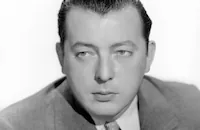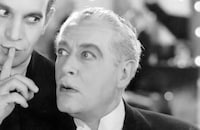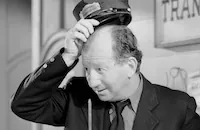The Garden of Eden
Brief Synopsis
Cast & Crew
Lewis Milestone
Corinne Griffith
Louise Dresser
Lowell Sherman
Maude George
Charles Ray
Film Details
Technical Specs

Synopsis
Vocalist Toni LeBrun leaves her aunt's bakery for Budapest to become an "opera singer," unaware that she has contracted to perform as a chorus dancer at the Palais de Paris. Toni soon loses her job when she repulses Henry von Glessing, a rich patron of the dancehall proprietress. She and Rosa, the wardrobe lady (a poverty-stricken baroness), take up residence in a posh hotel in Monte Carlo. There, Richard Spanyi, a guest at the hotel, smitten with Toni's beauty and her skill at the piano, at first shocks her with his impetuous manner; later, they become sweethearts. Toni, heir to a title because Rose adopts her, gets engaged to Spanyi shortly before her money runs out. She refuses when Spanyi's uncle, Henry von Glessing, tries to buy her off, and the wedding proceeds.

Director

Lewis Milestone
Cast

Corinne Griffith
Louise Dresser

Lowell Sherman
Maude George
Charles Ray

Edward Martindel
Freeman Wood

Hank Mann
Crew

Videos
Movie Clip


Film Details
Technical Specs

Articles
The Garden of Eden on DVD
The Garden of Eden follows aspiring vocalist Toni LeBrun (Corrine Griffith) as she leaves her loving family in Budapest to answer the call of an opera house in France called the Palais de Paris. Little does Toni know that her dreams of overnight stardom will takes many nights of hard work, the kind that she's not accustomed to, like wearing revealing outfits that accentuate her physical attributes instead of her vocal talent. Having realized that the Palais de Paris is nothing but a lurid cabaret, Toni's mood still doesn't improve when the delightfully decadent and suggestively androgynous owner Madame Bauer (Maude George) pushes her onto the wily cabaret's patron, Baron Henri D'Avril (Lowell Sherman). But she escapes from his forceful advances and agrees to go to Monte Carlo with the cabaret's recently fired seamstress, Rosa (Louise Dresser). Upon arrival at the Hotel Eden, Rosa reveals that she is actually the widow of a baron who died in the Great War, and has some money on which to live it up in Monte Carlo, if only for a little while. Rosa adopts Toni as her own daughter and gives her the faux title of baroness, so that she too can have a richer experience hobnobbing with the Monte Carlo elite. While at the hotel, Toni, now called "Antoinette," catches the eye of musician and songwriter Richard Dupont (Charles Ray), one of the Monte Carlo regulars. He and Antoinette begin a courtship that goes through the expected romantic comedy obstacles.
The Garden of Eden is marked by highly proficient technical advances, like John Arnold's dynamic camerawork (the same kind of fluid motion that director Lewis Milestone would bring to his anti-war classic All Quiet on the Western Front in 1930). There is also an expert process shot of Toni appearing in a leering, wolfish Henri's binocular eyeglasses, and fine art direction by the legendary William Cameron Menzies and interior decoration by Casey Roberts. The exterior design of the Hotel Eden is one fine example. But aside from behind-the-camera work, it is the charming and witty repartee between Corinne Griffith and Charles Ray that makes the film work. Both actors made this film at crucial junctures in their careers. Because silent screen stardom often benefited from descriptive monickers, Griffith was known as the "Orchid Lady," a name that promoted her as a paragon of beauty. But Griffith was more than just a pretty face. Griffith is a natural comedienne for the camera. She doesn't overact and push the comedy into crude slapstick. Griffith is enough of a pro to trust her director and the camera. While not the most memorable face, Ray Charles recalls a slightly stockier William Haines with a mischievious grin and easy-going manner.
The DVD's image quality is outstanding, as is the supplementary materials. Included are extensive text excerpts, lobby cards and other promotional material from the original 1928 press book for the film. Flicker Alley even left the blank in the text to show where the name of the press writer's local theater would be showing The Garden of Eden. Aside from the promotional material, there is also production stills from the estate of director Lewis Milestone, as well as an exploration of the now-lost Technicolor sequence from the film. Flicker Alley has also included two short subject films that were also released late in the silent era. The first and the best is a 10 minute short called Hollywood the Unusual (1927), a previously unknown travelogue of Los Angeles that tours the city's more unusual architectural landmarks, such as the famous and long-gone Brown Derby restaurant and the still-standing Graumann's Chinese Theater. It is a fascinating glimpse at Hollywood's early influence on pop culture. The other short is a nine minute "Tiffany Color Symphony" called The Toy Shop (1928).
This title is currently unavailable.
by Scott McGee

The Garden of Eden on DVD
The Garden of Eden
But the "opera house" turns out to be a girlie show and the "singing" position a showcase for her curvy figure. With the help of a sympathetic, motherly wardrobe mistress Rosa (Louise Dresser), Toni escapes grim Budapest for glamorous Monte Carlo and the posh Hotel Eden. There, Rosa escapes her life of seamstress drudgery for two weeks of luxury every year by using her dead husband's pension to bankroll her glamorous vacation. Her husband left her his pension and the title of baroness which Rosa, serving as a kind of "fairy godmother," also bestows on Toni by passing her off as her daughter. Toni soon attracts the attention of a rich Parisian bachelor, Richard Spanyi (Charles Ray), and his uncle Henry von Glessing (Lowell Sherman), who both attempt to woo her, with the expected race to the altar at the film's climax.
The Garden of Eden (1928) was a spin on the "Cinderella" story with a witty, risque Ernst Lubitsch flair (and in fact written by one of Lubitsch's favorite writers, Hans Kraly) in which the innocent beauty is helped to find a mate by her fairy godmother.
Lewis Milestone's fourth film was yet another illustration of the director's versatility which would be affirmed two years later when Milestone won a Best Director Academy Award for All Quiet on the Western Front (1930). The Garden of Eden was hailed by Variety for "beauty of star, beauty of production and human appeal set this one in as a winner from the getaway."
Dubbed "The Orchid Lady" of the silent screen, Corinne Griffith was a noted film beauty whose career took a dramatic downturn with the coming of sound. More a charismatic beauty than an actress, Griffith eventually retired from the screen in 1932 after a succession of failed films. Griffith perhaps justified her early retirement by asking, "Why should I go on until I am playing mother roles?" But Griffith's exit from the spotlight was hardly a failure for the multifaceted woman. She ended her film career a wealthy woman thanks to her clever real estate investments. And she later went on to write a successful memoir of her childhood, which became the film Papa's Delicate Condition (1963). Co-star Charles Ray's career also took a downturn in later years, when his uniformly goody two-shoes turns in a number of films led to his typecasting as a superficially bland, one-dimensional actor. The Garden of Eden was in some ways an effort to topple his wholesome good-boy image, by having Ray play a smooth European sophisticate.
All three leads in The Garden of Eden, including Louise Dresser, struggled with their onscreen images. Though she ran away from her Indiana home at age 16 to join a traveling stock company, Dresser was never able to completely lose her flat, Midwestern accent, considered by some to be a liability in the movies' transition to sound. Others have suggested her retirement was not brought on by the transition to talkies, but by the simple fact that her glory days in silent cinema were just slowly fading. Upon her retirement in 1937, Dresser worked to raise money for the establishment of the Motion Picture Country Home and Hospital in Woodland Hills, California.
Director: Lewis Milestone
Producer: John W. Considine
Screenplay: Hans Kraly, from play "Der Garten Eden, Komodie in vier Akten" by Rudolph Bernauer and Rudolf Oesterreicher
Cinematography: John Arnold
Production Design: William Cameron Menzies
Cast: Corinne Griffith (Toni LeBrun), Louise Dresser (Rosa), Lowell Sherman (Henry von Glessing), Maude George (Madame Bauer), Charles Ray (Richard Spanyi).
BW-78m.
by Felicia Feaster













